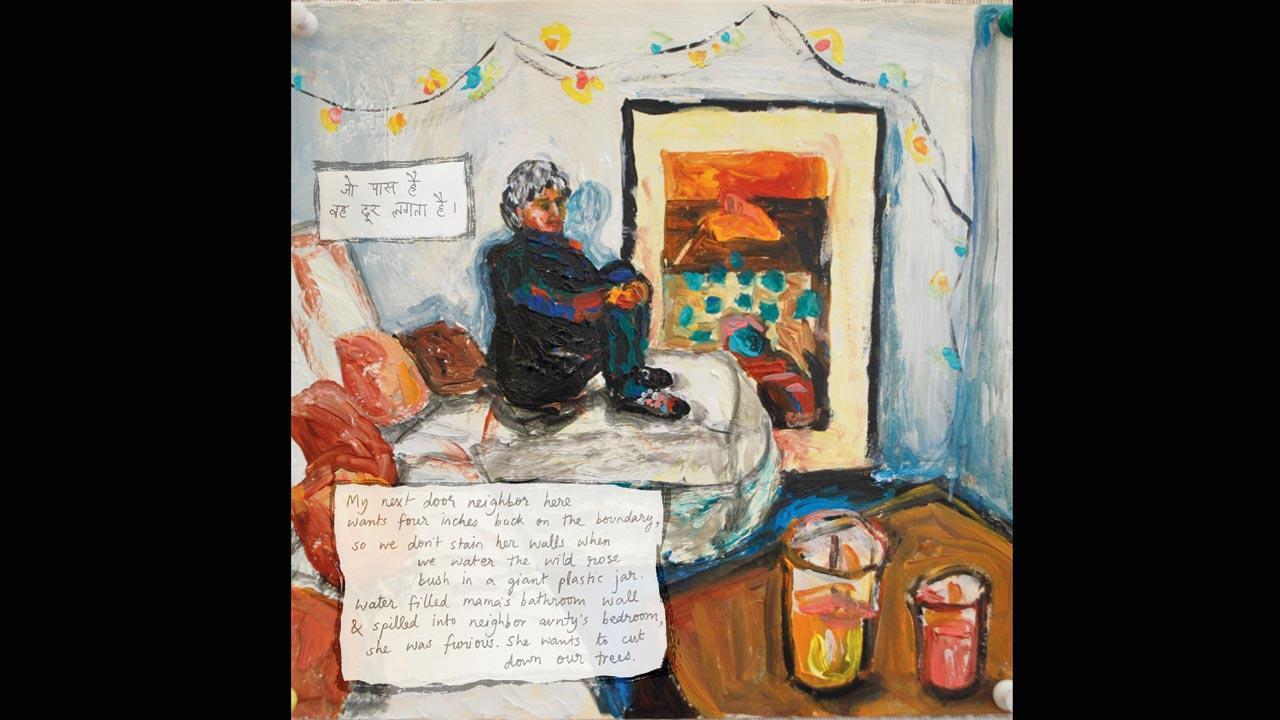An art platform that helps forge collaborations between artists from India and Pakistan has been home to innovative and reflective responses to the pandemic this past year

From a project titled Boundary Walls in the Kitni Door series, where artists Purvai Aranya and Sara Yawar juxtapose paintings and words
Like most arts organisations, The Pind Collective saw a period of inactivity as lockdown restrictions were imposed last year, stalling all plans for in-person projects and pedagogical expansion. But the period also enabled its founders to view the collective not just as a means of generating artistic content, but also as one that provided a way to connect and reflect on the moment. “We realised that we function not just as a platform, but also as a community,” says Avani Tandon Vieira, one of the co-founders of the collective, which started in 2016, centred around a process of creation and response between artists from India and Pakistan, contemplating shared histories, identities and experiences.
ADVERTISEMENT
Driven by a need to reach out in this moment of collective crisis and incertitude, the founders sent open prompts to those they had collaborated with in the past. Their responses, innovative and thoughtful, made up the Collective’s Artists in Isolation project. Among these were a Karachi-based artist’s observations of everyday objects that became a part of routine activities like cooking and disinfecting groceries, with occasional rooftop views of the sunset during the lockdown, and attempts to create colour palettes out of them.
Co-founder Ansh Ranvir Vohra’s short film Quarantine Thoughts is about how this forced period of confinement was not necessarily one of productivity.
Another project initiated by the Collective in the past few months, which has allowed them to engage with their central preoccupations with distance and proximity in a new context, is Kitni Door, a series of collaborative zines by artists from the two countries. “A starting point of the conversations for us was the shared experiences that we have had as nations that went through the Partition. And for the first time in a long time, the pandemic has been another shared collective experience. So, when we are speaking of shared experiences, we are not just speaking of what happened 70 years ago, but something we’re still trying to navigate our way through in the present,” observes Vohra. For these, he says, some artists shared letters and voice notes about their lives and creative processes, while others exchanged ways to tie sarees over Zoom calls. Zines also grew out of artists painting together on Zoom, sharing words and making images of places and memories the words reminded them of. In Boundary Walls, artists Purvai Aranya and Sara Yawar created layered images with paintings and words to explore the limits of known space while in A Matter of Venn, Saniya Jafri and Sudeepti Tucker explored the idea of overlaps—of thoughts, feelings, ideas and images—in a visual sense as Venn diagrams.
Sana’s Pantone: Karachi during lockdown series created mock Pantone swatches from everyday objects
The Pind Collective has also recently initiated the Secret Histories Project, a collaboration between artists and organisations in India and Pakistan, which through a series of short visual guides, aims to document overlooked facets of the subcontinent’s past and present, tracing histories of sweet shops, places of worship or cinema halls. Also interesting is the duo’s exploration of the history of iconic summer cooler Rooh Afza, woven with those of subcontinental migration and invention, for a collective called zinedabaad. Rooh Afza was founded by Hakim Hafiz Abdul Majeed of Hamdard Laboratories in 1906, as a herbal mix that would help Delhi’s people stay cool in the summer. After his death, and the Partition in 1947, while one of his sons stayed back in India, another migrated to Pakistan and launched a separate Hamdard company there, with the concentrated squash since then being manufactured in both countries.
Ansh Ranvir Vohra and Avani Tandon Vieira
What has of course, aided these collaborations in the past few months is technology and the increased comfort with it. “The tools and means of communication have become so much stronger that we’ve actually been able to be more ambitious in terms of the number of interactions that we can enable between collaborators,” admits Vieira. But these digital explorations, she hopes, will be momentary. “The goal is to get to a post-COVID space where we can physically display work, have joint exhibitions in India and Pakistan and allow people to engage with the work that we create. That’s all a dream at present.”
 Subscribe today by clicking the link and stay updated with the latest news!" Click here!
Subscribe today by clicking the link and stay updated with the latest news!" Click here!






